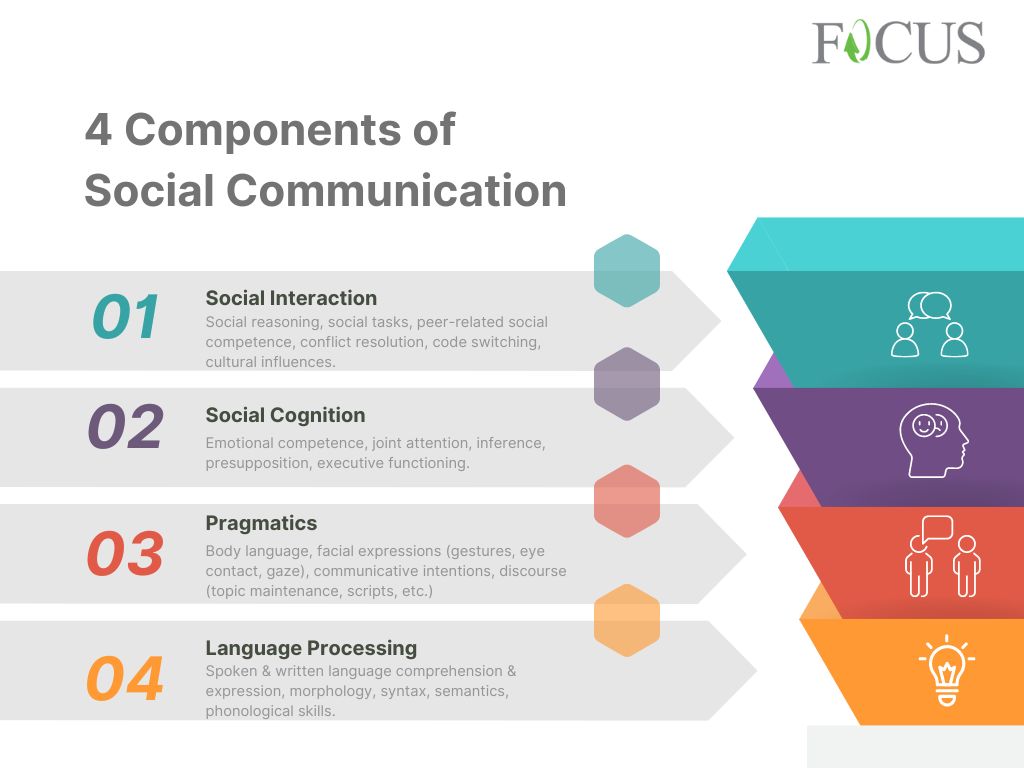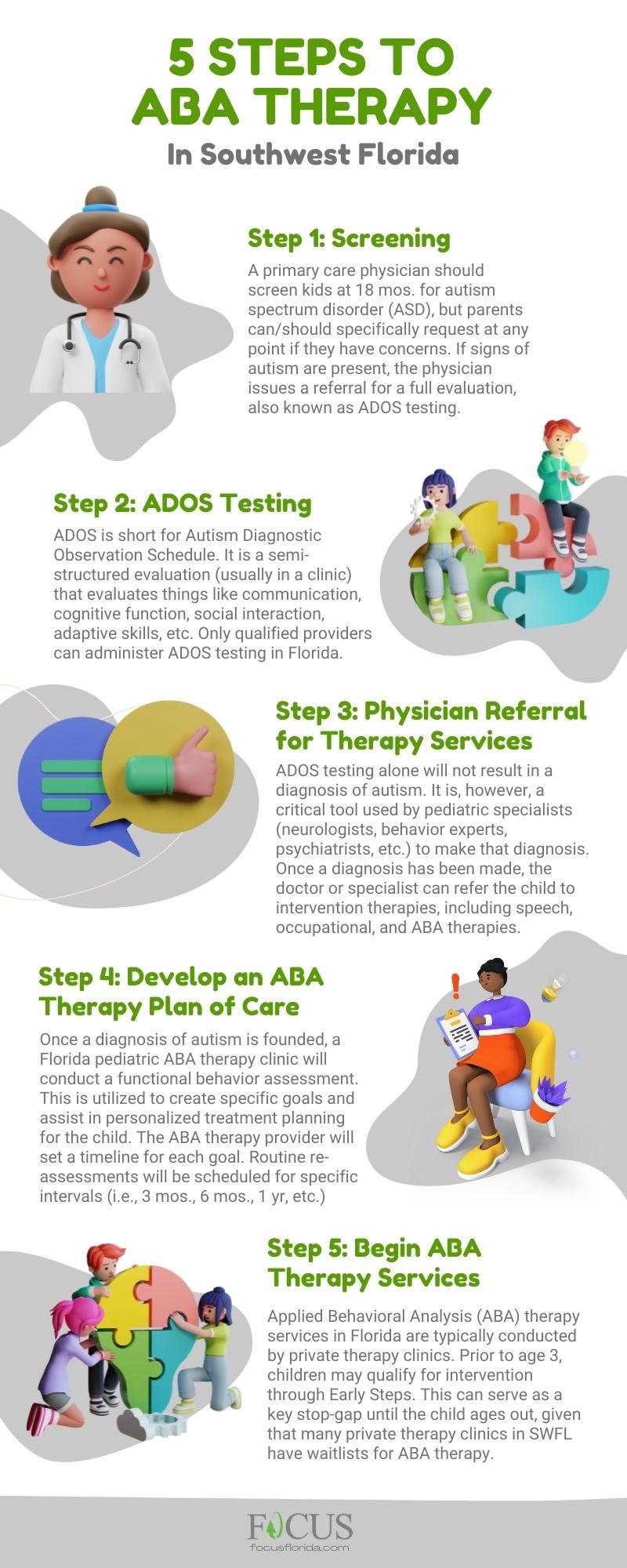Blog
Fort Myers Feeding Therapy Tips for Picky Eaters
Our Fort Myers feeding therapy pros at FOCUS Therapy recognize that it's totally normal for lots of kids to shy away from new, unfamiliar foods. It's not just the difference of taste, but the way it looks, smells, and feels.
For kids with sensory processing disorders and/or conditions like autism who are notoriously risk-averse when it comes to new foods, it can be especially tough to incorporate a healthy variety into their diet. But our Fort Myers feeding therapy experts have many techniques that can help them slowly overcome these obstacles - and have fun while they're doing it!
One tip for parents:
![]() With picky eaters,
With picky eaters, ![]() serving new foods
serving new foods ![]() next to their favs
next to their favs ![]() means the new food
means the new food ![]() won't stand a chance.
won't stand a chance. ![]() Instead, offer them a small sample of the new food
Instead, offer them a small sample of the new food ![]() with something that's only semi-preferred.
with something that's only semi-preferred. ![]()
Let's say you're trying to incorporate a single new vegetable in their diet. Their absolute favorite food is pizza. If you serve them a small side of carrots next to their pizza, those carrots are likely going to go untouched. A better alternative would be to serve those carrots next to another main dish that they like/tolerate just fine, but isn't their favorite food.
If your child is extremely averse to any new foods, you may need some additional help from a feeding therapist. As we mentioned in a recent blog post, pediatric feeding disorder is a new diagnosis that was only formally recognized last October by the American Academy of Pediatrics.
If you're struggling to get your children to incorporate a healthy variety of foods into their diet and it's impeding their growth and well-being, it's time to talk to your pediatrician about getting some help with feeding therapy intervention.
FOCUS offers pediatric speech therapy in Fort Myers and throughout Southwest Florida. Call (239) 313.5049 or Contact Us online.
Additional Resources:
PFD-ICD-10 Toolkit, Feeding Matters
More Blog Entries:
A New Diagnosis: Pediatric Feeding Disorder & How Fort Myers Feeding Therapy Can Help, June 27, 2022, Fort Myers Kids Feeding Therapy Blog for Southwest Florida
- Categorized: Feeding Therapy
Fort Myers Speech Therapists Teach Social Communication to Neurodivergent Kids
- focustherapy
- Jul 22, 2022
- Comments: ( 1 )
Our Fort Myers pediatric speech therapists recognize there is SO much more to communication than just saying words. ![]()
![]()
![]()
![]()
![]()
As explained by the American Speech & Hearing Association (ASHA), social communication is how and WHY we use language to interact with others. Even though there isn't precisely a "right" or "wrong" way to communicate, there are so many unwritten rules of communication. Over time, we learn how to adjust not only what we say but how we say it - and when - to meet the particulars of whatever situation we're in.
For example, there are a lot of things you might be thinking that you know would be socially unacceptable to say to someone. You may be bored with the stories they tell or not be the biggest fan of what they're wearing that day. But you know the unwritten rule that saying these things would not only be unkind and hurtful, it doesn't serve any good purpose (like keeping you safe).
When young kids are still learning about social communication, they're likely to break these sorts of rules with regularity. (You may have heard the saying, "Kids say the darndest things." And it's because they are still learning about what "filters" they should be putting on their communication.)
But it's not just about what we say. It's what our body language says, whether we can pick up when someone else is trying to engage us in conversation, whether we can infer what someone might be feeling from their facial expression...
Social communication is something a lot of neurotypical people to take for granted, but for kids with autism and other conditions, it doesn't come easily. Our Fort Myers speech therapists break down each social communication component one-by-one to teach our patients how to better understand the world around them - and effectively communicate.
FOCUS offers pediatric speech therapy in Fort Myers and throughout Southwest Florida. Call (239) 313.5049 or Contact Us online.
Additional Resources:
Social communication in autism, explained, April 19, 2018, By Lydia Denworth, Spectrum News
More Blog Entries:
Why FOCUS Asks Parents to Stay in the Waiting Room During Evals, Sessions, April 2, 2022, FOCUS Therapy Fort Myers Blog
- Categorized: Articles
A New Diagnosis: Pediatric Feeding Disorder & How Fort Myers Feeding Therapy Can Help
Virtually all children go through some stage of “picky eating,” and it may be both temporary and harmless. However, when it persists and a child fails to grow and thrive alongside their peers, they may be diagnosed with pediatric feeding disorder – a new diagnosis that Fort Myers feeding therapy can help to treat.
The condition was formally recognized last October, as explained by the American Academy of Pediatrics.
Pediatric feeding disorder (PFD) is understood to involve impaired oral intake that is not age-appropriate, and is associated with medical, nutritional, feeding skill, or psychosocial dysfunction. It lasts more than two weeks, and is associated with 1 or more of the following:
- Medical dysfunction (cardiorespiratory compromise during oral feeding or aspiration/recurrent aspiration pneumonitis).
- Nutritional dysfunction (as evidenced by malnutrition, specific nutrient deficiency/significantly restricted intake of one or more nutrients resulting from restricted dietary diversity, or reliance on enteral feeds/oral supplements for hydration and/or nutrition).
- Feeding skill dysfunction (need for texture modification of liquid or food, use of modified feeding position/equipment, or modified feeding strategies).
- Psychosocial dysfunction (active/passive avoidance of child when being fed, inappropriate caregiver management of child’s feeding needs, disruption of social functioning in a feeding context, or disruption of caregiver-child relationship associated with feeding).
The full diagnostic criteria is spelled out by the Journal of Pediatric Gastroenterology and Nutrition.
- Categorized: Feeding Therapy, Speech Therapy
Fort Myers ABA Therapists’ Tips for Supporting Siblings of Kids With Autism
Autism Spectrum Disorder (ASD for short) is now diagnosed in 1 in 44 children in the U.S. As a broad range of conditions characterized by deficits in social skills, speech, communication, repetitive behaviors, and other challenges, the ripple effect of the condition impacts more than just the individual diagnosed. In fact, home carryover of early intervention therapies (speech, occupational, and ABA) is most effective when everyone in the home is committed to following our recommended strategies.
Our Fort Myers ABA therapists recognize that families – and neurotypical siblings in particular – may struggle with anxiety, depression, and social difficulties, as outlined in a recent study. On the flip side, researchers also found that children with autism who have a neurotypical older sibling tend to have better social skills than those who did not.
The key is striking a balance, and ensuring that both children are supported – and given the tools to understand each other.
A child with autism may, inevitably, demand more of a parent’s time, energy, focus, and resources. This may leave siblings of kids on the spectrum feeling as if they are being overlooked. It’s important to validate and address these feelings so that it doesn’t grow into a much larger issue as time goes on.
- Categorized: ABA Therapy
5 Steps to ABA Therapy in South Florida
ABA therapy is considered the gold standard treatment for kids with autism spectrum disorder (ASD). But the process of starting this therapy is not as simple as calling and setting an appointment. There are several steps that must be taken to initiate the process.
It begins by recognizing the early signs of autism, and sharing these concerns with your child’s pediatrician. Doctors should screen all children at 18 months for risk of autism as a matter of routine – but parents absolutely can bring concerns to their doctors at any point. Signs of autism can be clearly identified as early as 12-months-old.
The doctor will then initiate a referral for a full assessment, known as ADOS testing. This test must be administered by a qualified provider. FOCUS Therapy does provide ADOS testing for children in Southwest Florida. The results of the ADOS test are then shared with a pediatric specialist, who ultimately makes the diagnosis and then issues a referral for early intervention services – such as ABA therapy, speech therapy, and occupational therapy.
If your child is under the age of 3 in Florida, they may qualify for early intervention services through a state program called Early Steps. This can serve as an important stop-gap, given that many private therapy clinics that offer Applied Behavioral Analysis in Southwest Florida have waitlists.
Our ABA therapy services at FOCUS Therapy are conducted one-on-one, in-clinic with experienced professionals called RBTs (registered behavior technicians), with oversight from a BCBA (Board Certified Behavior Analyst) and physician specialist.
If you have questions about autism screening, ADOS testing, or ABA therapy in Southwest Florida, our trusted team of therapists, coordinators, and insurance billing professionals can help.
FOCUS offers ABA Therapy and ADOS testing in Fort Myers and throughout Southwest Florida. Call (239) 313.5049 or Contact Us online.
Additional Resources:
What Are the Early Signs of Autism? HealthyChildren.org, American Academy of Pediatrics
More Blog Entries:
5 Fort Myers ABA Therapy Techniques, May 24, 2022, Fort Myers ABA Therapy Blog
5 Fort Myers ABA Therapy Techniques
- focustherapy
- May 24, 2022
- Comments: ( 1 )
Behavior therapy – specifically, applied behavioral analysis, begins with understanding the science of behavior. At our Fort Myers ABA therapy clinics, we use this understanding to employ specific strategies proven to help children with autism and other conditions achieve their goals – ultimately allowing them to gain greater independence and engage more fully with the world around them and people in it.
As explained by the American Psychological Association, ABA therapy is an evidence-based practice, meaning it’s supported by peer-reviewed literature. It identifies the motivation behind the behavior before addressing it with one or more proven strategies.
Each Fort Myers ABA therapy plan of care must reflect what reinforcements are most effective with that specific child, with clear goals we want to see them meet within a set time frame. Our ABA therapy team then works with kids one-on-one with them – day after day, week after week, and month after month, and sometimes year after year. We want to see them thriving in all environments – from home to school to play dates to community events – to the fullest extent of their capabilities.
Most all strategies involve some use of the ABC’s of behavior. That is, we study the Antecedent, then the Behavior itself, then the Consequence. By studying each element, we can determine what is the motive or what’s being communicated by that behavior – and then change either the antecedent or the consequence with the goal of altering the behavior.
Top Fort Myers ABA Therapy Techniques

- Categorized: ABA Therapy
- Tagged: ABA therapists Fort Myers, ABA therapy, Bonita Springs ABA therapy, Cape Coral ABA therapy, Fort Myers ABA, Fort Myers ABA therapists, Fort Myers ABA Therapy, Fort Myers autism resources, Fort Myers kids autism, Fort Myers therapy ABA, Lehigh Acres ABA Therapy, Southwest Florida ABA therapy, SWFL ABA therapy
5 Ways Play Builds Child Development
Our Fort Myers occupational therapists often refer to play as the occupation of children. It may look on the surface as if all we do at our clinic is have fun. (And we DO have TONS of fun here!) But what we’re really doing is bolstering child development through play, which has proven to be the most effective way to teach children critical life skills in early intervention.
Study after study has proven time and again that children learn best through play – when it’s fun!
“There’s a reason our pediatric therapists never approach a session with a child saying, ‘Ok, let’s go do some therapy,'” explained FOCUS Therapy Owner/Founder Jennifer Voltz-Ronco. “No, we say, ‘Let’s go play!’ Because we know that creating a fun, safe, upbeat environment is going to make them want to participate, want to take the next step, want to learn the new skill. Ultimately, that’s where we make the most gains. Those are the lessons that are going to stick.”
Here, we offer some basics on how child development is promoted by simple activities that involve play.
FOCUS offers pediatric speech therapy in Fort Myers and throughout Southwest Florida. Call (239) 313.5049 or Contact Us online.
Additional Resources:
Play in Early Childhood: The Role of Play in Any Setting, Center on the Developing Child, Harvard University
More Blog Entries:
FOCUS Therapy Hires Therapists Who Genuinely Care, March 3, 2022, FOCUS Therapy Fort Myers Blog
- Categorized: Occupational Therapy
- Tagged: ABA therapy Fort Myers, developmental delay Fort Myers, early intervention Fort Myers, Fort Myers occupational therapist, occupational therapist, occupational therapy, occupational therapy Fort Myers, pediatric physical therapy Fort Myers, speech therapy Fort Myers
Fort Myers Speech Therapy for Preemies With Speech & Language Delays
Preterm babies, often called “preemies,” are at higher risk of speech and language delays as they develop, compared to babies born full-term. Approximately 1 in 10 babies in the U.S. is born too early, according to the March of Dimes. Our Fort Myers speech therapy team strongly recommends that parents of babies born prior to 37 weeks gestation keep a close eye on every developmental milestone, and seek early intervention therapies to assist where delays are noted.
“We’re so lucky to be living in an age where medical advancements provide even babies born extremely preterm with a good shot at survival,” said FOCUS Therapy Owner/Founder Jennifer Voltz-Ronco. “Although many preemies go on to develop normally, many do benefit from extra help – particularly in the form of early intervention speech therapy, occupational therapy, physical therapy, and feeding/swallowing therapy.”
A 2018 study published in the journal Medicine revealed babies born preterm tend to have smaller vocabular at age 3 compared to their full-term peers. They also develop gestures, words, and language understanding at a slower rate than full-term babies. This gap in language skills can expand and continue through childhood, particularly if it’s not treated.
Brain research development shows us time and again that language learning begins at birth, with the window between 6 and 24 months being a golden opportunity to maximize the brain’s neuroplasticity and support development of early communication skills.

Many babies born prematurely benefit from these therapies up to age 5 (sometimes beyond), with early intervention reducing the struggles they will face as they get older. As time goes on, the delays become less noticeable, with many preemies going on to engage in academics, arts, and athletics at the same level as their peers. Many of our preemie patients later succeed to the point you would never know they were born early unless they told you.
6 Signs Your Baby Might Need Physical Therapy or Occupational Therapy
Are you concerned your baby isn’t meeting their developmental milestones for sitting, standing, walking, and balance? It’s important to discuss your concerns with a pediatrician, as they may need a referral for physical therapy and/or occupational therapy.
There are many conditions for which an infant, toddler, or young child may benefit from physical or occupational therapy. What’s important is early intervention. The sooner your child can “catch up” to their same age peers, the fewer challenges they’ll struggle with down the road.
Our pediatric physical therapy and occupational therapy teams help children with both gross motor skills and fine motor skills. If you suspect your child *might* need these interventions, it’s best not to wait and see. Talk to your child’s pediatrician to obtain a referral for a full evaluation, which will provide insight into whether your child is behind developmentally and may benefit from physical and/or occupational therapies.
FOCUS offers physical and occupational therapy to kids in Fort Myers and throughout Southwest Florida. Call (239) 313.5049 or Contact Us online.
Additional Resources:
Infant Physical Therapy: What You Need to Know, Therapy & Wellness Connection
More Blog Entries:
At What Age Should My Child Start Speech Therapy? April 5, 2022, FOCUS Therapy Blog










